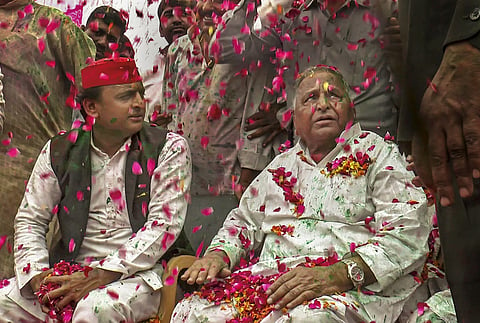

That ‘family’ plays an important factor in the amphitheatre of Indian politics is well established.
What makes the ongoing election for the Mainpuri Lok Sabha seat in Uttar Pradesh a curious case for study is how feud within a family influences the outcome of an electoral contest.
The by-election is being held to fill the vacancy created by the death of the state’s three-time chief minister and Samajwadi Party (SP) patriarch, Mulayam Singh Yadav.
In the last seven terms, the constituency has been held by Mulayam himself (four times) or members of his family for SP. The twist this time is that while the SP has fielded Mulayam’s daughter-in-law and former UP chief minister Akhilesh Yadav’s wife, Dimple Yadav, to retain the family stronghold, ruling BJP has put up a strong rival in a former associate of Mulayam, Ram Singh Shakya to wrest the seat.
Shakya, a two-time SP member of Lok Sabha from neighbouring Etawah, is reportedly close to Mulayam’s younger brother Shivpal Yadav, who had broken away from SP after took control of the party from an ageing and waning Mulayam and formed his own Samajwadi Pragitisheel Party (Lohia).
Though Shivpal’s outfit contested state assembly elections earlier this year as an SP ally, he had recently dissolved his outfit and announced support for Uniform Civil Code, fuelling speculation that he was hobnobbing with the BJP.
Against Akhilesh’s bid to consolidate the family solidarity, the BJP hopes to exploit the simmering feud in the Mulayam family. An expression of this intent was that Shakya visited Mulayam’s native village Saifai before filing his nomination for the Mainpuri seat to pay homage to Netaji, the nickname by which Mulayam was addressed by his followers.
Fully aware of the trap, Dimple Yadav and her camp is trying to project that the by-poll is about all about “the honour of Netaji." Her husband and SP chief Akhilesh Yadav has gone out of the way to mollify Mulayam’s estranged brother Shivpal. Kept away from the party’s campaign in the state assembly elections, his name figures in the list of SP’s star campaigners for Mainpuri by-polls.
After calling upon Shivpal ahead of the elections with his wife, Akhilesh shared a picture of the meeting and tweeted: Along with the blessings of 'Netaji' and elders of the family, the people of Mainpuri are also with us."
How the undercurrents of family consolidation and family feud play out in the election remains to be seen. However, family feuds in India’s political families are not new.
From Nehru-Gandhis at the pan-India level to the sundry regional outfits across India, many a political outfit have witnessed the transfer of leadership being passed on to the next generations.
Parties led by Mulayam Singh Yadav in UP, Lalu Yadav in Bihar, the Chautalas in Haryana, K. Karunanidhi in Tamil Nadu and Bal Thackeray in Maharashtra have followed the principle of dynastic rule despite their avowed profession of inner-party democracy.
Ironically, in almost all these outfits, political dynasties have witnessed running family feuds that have turned bitter with the passage.
The dramatis persona in these family dramas and their relationships vary with complex complications, but the theme is familiar— a sense of being left out of the family’s political heritage and hankering for power.
Given the feudal backdrop of Indian politics, this is not surprising. Like rule is succession in property matters, family also becomes the fulcrum of the transfer of political and social capital of a patriarch.
Unlike property, however, inherited political capital is much more difficult to maintain. The case of Mulayam Singh Yadav’s SP illustrates this.
After heading a coalition government in UP in 1989-91 with outside Congress support, the Socialist leader formed the SP in 1992 and mobilised the marginalised castes and Muslims under one umbrella.
Though he formed the state government in UP twice after that, it was always through short-lived tactical alliance/understanding with his love-hate rivals, the BSP and the BJP.
It was only in 2012 that the SP formed a government on its own by defeating the BSP. By that time, he had given indications that he wanted his Akhilesh to inherit his political heritage.
However, after Akhilesh Yadav became the state's chief minister, the role of Mulayam Singh Yadav in the party diminished. The difference between Akhilesh Yadav and his uncle, Shivpal Yadav, also emerged in 2016. His relationship with his father Mulayam also turned far from cosy.
As a result, the party's roots became weak, and the BJP took advantage of it and defeated the SP in the 2017 assembly elections. At that stage, Akhilesh had entered into an alliance with the Congress--- a move that was cruised by Mulayam. The SP’s vote share dipped from 29.19% in 2012 to 21.82% in 2017.
Since then, Akhilesh has tried several unsuccessful experiments to stop the BJP’s victory march. In 2019, the SP allied with BSP— again against Mulayam’s wishes— but could win only five Lok Sabha seats in UP with an 18% vote share.
In the 2022 state assembly elections, the SP did better but still fell short. However, two months back it has lost two Lok Sabha seats in UP— Rampur and Azamgarh—that were considered its stronghold.
Clearly, the stakes are high for Akhilesh’s party in the Mainpuri by-election. But even if he manages to subdue the family feud and retain his late father’s seat, he will have to remember that Mulayam Singh’s political constituency was much wider and broader.
(Yogesh Vajpeyi is a freelance journalist and media consultant. These are the writer's views.)